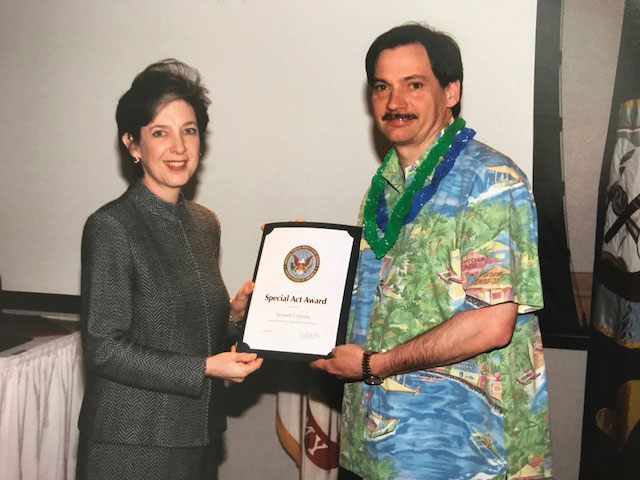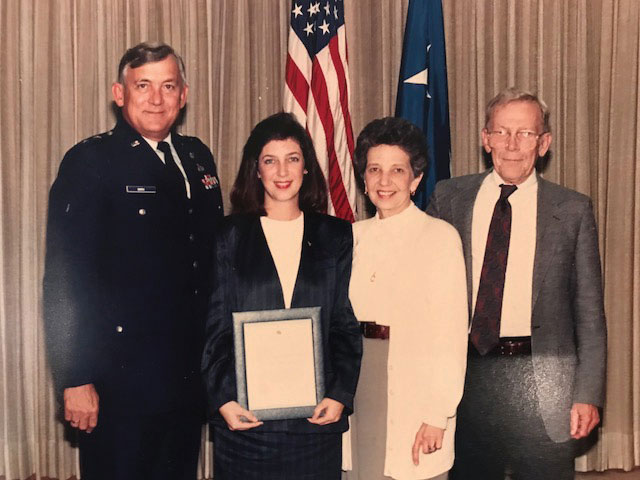Psychology and Public Administration alumna Ann Bridges Steely says her biggest career risks brought the greatest rewards.
Growing up in Homewood, Alabama, as the oldest of three daughters, Ann Bridges Steely never saw herself as terribly adventurous. Though she began her undergraduate studies out of state, she came back to Birmingham and finished at UAB with a bachelor’s in psychology in 1976. She took a job with the Jefferson County Personnel Board right after graduation where she administered testing to various county employees. But she found herself wanting to enhance her skills and knowledge, so she started looking for graduate programs.
“I really wanted to be certified in testing, so I started looking at programs with different schools of education,” she says. “But about that time, I found out about the new Master's in Public Administration that UAB was offering. It was just starting and I was in the first class to graduate in 1980.”
In the new MPA program, Steely found herself surrounded by professionals who worked in the public sector and for nonprofits. “They were seasoned professionals who were just waiting for a master’s program like that to come around,” she says. “I learned so much from them about administration, bureaucracy, and holding my own in a male-dominated environment.”
Steely didn’t know it then, but those lessons would come in handy when she took her first big leap off the professional high dive. She had applied for the White House Internship Program, but during the economic recession of the early 1980s, funding for the program had been cut. Unbeknownst to Ann, however, the list of applicants was circulating through the federal government, including the Air Force.
“The list landed on the desk of an Air Force Colonel who happened to be from Anniston, Alabama, so he took a liking to me,” Ann says. “Maybe because we were both from Alabama, I don’t know. But he called me and offered me a job with the Air Force. He convinced me to move to San Antonio and make a career.”


Off She Goes
Ann packed up her meager belongings, said goodbye to her parents and sisters, and drove herself to San Antonio, a city she’d never even visited. “My parents were crying when I left with my little U-Haul,” she recalls. “It was hard for them to let me go, but they knew I was happy and they knew I had a good job.” It was a bold and brave move for a young woman in her early 20s, who had never considered a civilian military career and who had no experience working for the federal government.
"I took jobs that other people didn’t want. Those are the kinds of risks that give you the greatest rewards."
“I hit it at the right time,” she says. “I went in with a master’s degree right when the military was trying to professionalize their work force. Plus, Reagan was president and there was a lot of spending on defense.”
Ann’s first job allowed her to use her undergraduate and graduate degrees, along with her work experience at the county personnel board. She stayed at Kelly Air Force Base in San Antonio for 18 years, eventually moving into contract negotiations. “I liked the military environment,” she says. “I liked the structure and the professionalism. As a contract negotiator, I helped define requirements for personnel positions, I solicited proposals, I really negotiated the terms and conditions for all kinds of contracts and services.”
When she had the opportunity to move to D.C. to work for the Federal Deposit Insurance Commission (FDIC), her husband agreed to follow her. After three years with the FDIC, she moved into defense contracting, working for Raytheon for another six years. “I had such a fulfilling, worthwhile career,” she says. “I loved it, the entire 22 years I was in the Air Force and the Department of Defense. I had never been exposed to the military when I was growing up, but I wish I had been, because for young professionals it’s a wonderful opportunity. Especially if you do any ROTC training, they give you a lot of responsibility at a young age, more than the civilians.”


Although as a young woman Ann had to stretch herself to take a job with the Air Force in an unfamiliar city, her long and successful career is proof that her bravery paid off. From early professional recognition (BOTTOM RIGHT) to many years of personal travel with her husband Phillip Steely and friends and family (ABOVE), Ann has had a rich life that she attributes in part to her willingness to take risks. Grounding her throughout have been her mother and sisters (TOP RIGHT).

Rising to the Top
While Steely didn’t benefit from the acceleration that ROTC training could have given her career, she nevertheless rose quickly through the ranks. And she says much of that had to do with her independence and her willingness to take risks. “It really started with that first decision to take the job with the Air Force,” she says. “I paid my own way to move and I didn’t know a soul in San Antonio. I took jobs that other people didn’t want. Those are the kinds of risks that give you the greatest rewards.”
As a young woman in a primarily-male work environment, Steely was aware of both her gender and her age as she advanced to higher-level jobs. “I never felt like being a woman—whether in uniform or not—was an issue. I saw plenty of women be successful,” she says. “But at the same time, as I was moving up the ranks, there were no women at the G-13 level, which is mid-management, by the time I got [to that level]. After four years there were a handful, but I was also the youngest to reach the G-15 level, which is equivalent to a colonel. But there were plenty of times when I was young and the only woman in the room and I was asked to get their coffee. I moved up every year for five years and they would look at me and couldn’t believe I was in the position I was in. The bias was there, but I’ve always thought it’s often how you respond to it.”
How did she respond to the request for coffee? “I would just say, ‘Let me see if I can find someone to do that.’”
And what did her male superiors do then? ”They would just laugh, maybe a little selfconsciously.”
Steely continues. “Generally, I felt that if I performed it was okay, but I’m not naïve: I’m aware there was probably harassment. But in my experience, if I held my own and worked hard and did good work, I would be rewarded.”
“I would always tell people, men or women, when they would ask me about the work/life balance or whether they should move or stay, that there are tradeoffs. Making a decision will close the door on some opportunities, but it will open other doors.” Still, Steely says, she had her moments of self-doubt and worry. “Every time I took a career risk, I would question myself. When I moved from contracting to project management, which was dominated by engineers, I cried, ‘What have I done?’ But that always led me to the most career growth. Not necessarily promotions, but I grew. You learn from every job, even the bad ones.”


Giving Back
Steely is in the process of establishing a program in the Department of Political Science and Public Administration that will enable MPA students to have an internship in D.C. “I want to give people the opportunities to do the things they may not have thought of,” she says. “I loved my career with the federal government and want our UAB MPA students to be able to explore the same pathways. It’s important that students feel safe taking that risk.”
Steely says that, just as she had strong mentors during her career, she wants to be able to play the role of supporter and advisor to younger people entering the professional workforce. “It’s important they realize that you don’t know what you will excel at until you try,” she says. “You can feel that you don’t have control, but you sometimes have more control than you think. You have to really try to learn from what you fail at, and find some mentors. You can never outgrow a mentoring relationship, and you can learn from anybody, just as you can mentor anybody.”
After a long and successful career, her biggest piece of advice? “There’s a great big world out there. Take a leap off the high dive.”


